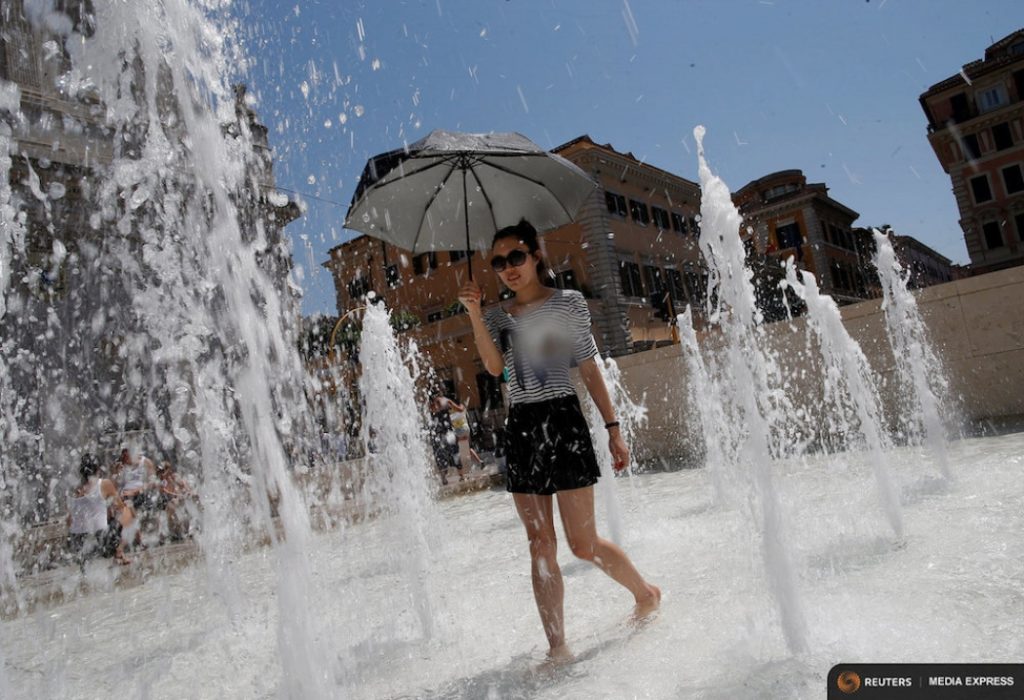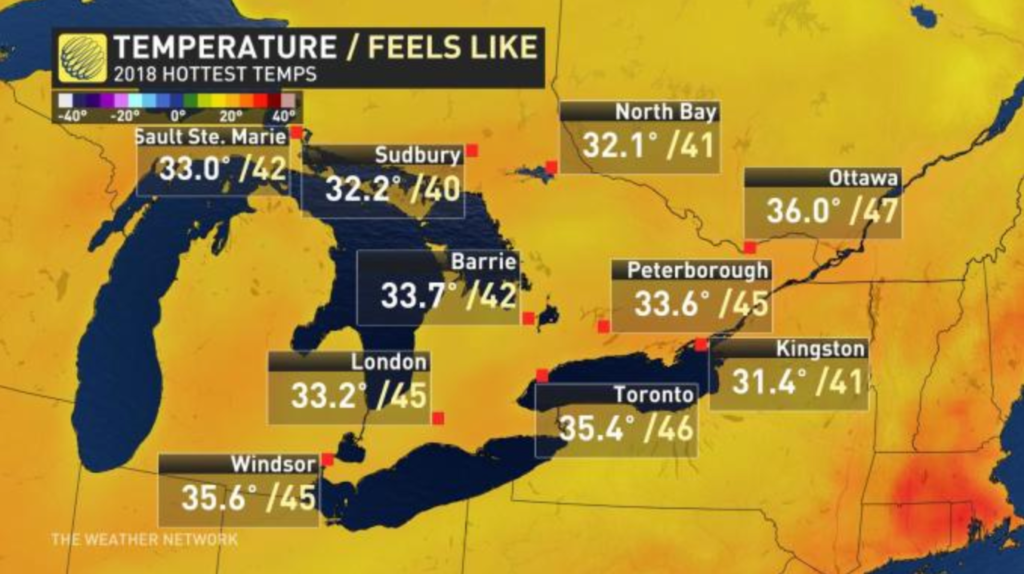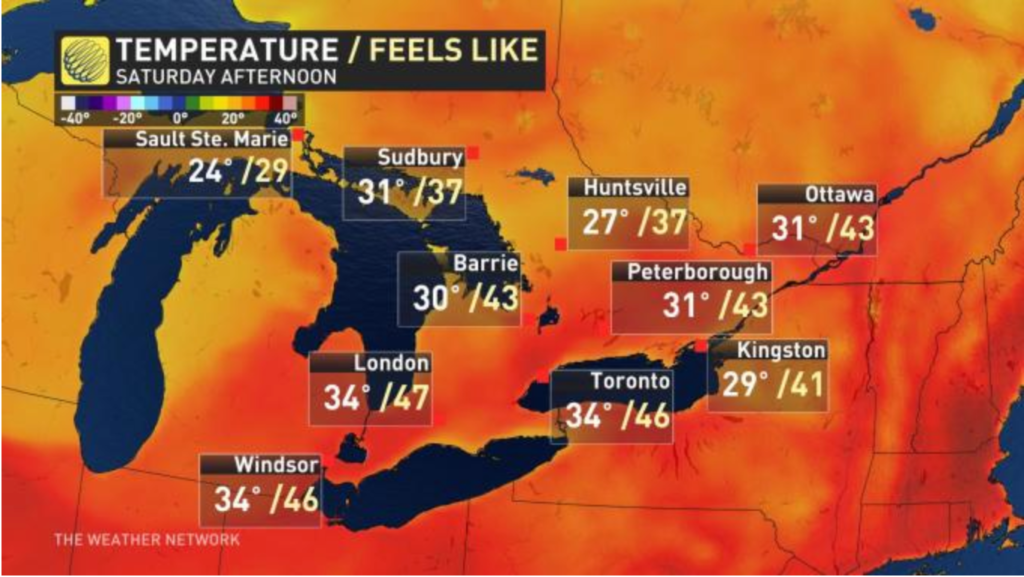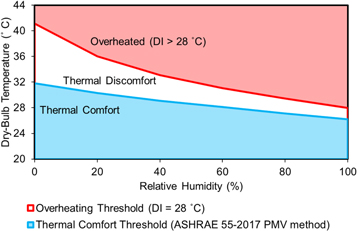
Source: https://www.climatecentral.org/news/half-world-deadly-heat-waves-2100-21554
MATT & VASU: Have you noticed when climate change deniers talk about global warming, especially when its really really cold out and somehow that means it doesn’t exist?
Well it’s days like today that kind of tend to prove them absolutely wrong about how hot the planet is getting with every ounce of carbon in the atmosphere. And it’s about to get much worse if we don’t stop our carbon emissions or cut our carbon footprints immediately!
We are currently sitting in Waterloo, Ontario and today’s temperature forecast high is a whooping 44 degrees Celsius (that’s 111 F for folks in the US)! This is not only happening here, but around the world summer records are being broken by “unusually hot weather” and heat waves spanning for days on end.
Is this normal? The answer is NO! and please don’t say “it’s the summer – there are going to be days when it is hot”, because normalizing unusually hot days is not going to make the problem of climate change just disappear. In fact, if anything, it’s going to make us forget that this time around we are the ones responsible for causing major shifts in our planet’s normally stable climate.
MATT: I still remember the good old days when I spent my summers going to the park and on the way back home you could see the mirage on the road because of the heat. There were always one or two days of the year where it was just too unbearable to be outside, days where it was necessary to stay indoors with the AC on. These were the days, even as a kid, when adventure could wait for another day because it was just too hot outside!
Those days now seem so long ago, with extreme heat lasting for weeks nowadays. Currently we have been experiencing a week straight of extreme heat and humidity. It’s funny because it doesn’t seem like it’s been as bad this year as last year, yet when I looked it up it’s actually been worse so far this year. We always hear about how every year is the hottest on record and it really does seem to be true.


Last year’s extreme heat may not have been as hot, but it was just longer. It seemed like the heat was just continual, it went on for days and days with no relief – imagine what it must be like for countries near the equator! It is ironic how human memory just forgets these things and adapts to the short term, yet it now seems more important than ever to remember and plan for it.
This year we decided to plan for it – and that is why we purchased a portable air conditioner in the spring. Which now it turns out, was not only a smart purchase, but a necessary one! We don’t use it super frequently, just when we really need it and so far its really come in handy. Last year we would have to go out somewhere that had AC in order to avoid all the heat, but that’s not always a viable solution. You have to sleep at home and you cant always be going out and spending money at places because it’s got AC. I’ve noticed a lot of people in our building have purchased them over the past year too – it seems like other people are also trying to beat the heat in their own homes.
VASU: Yes, heat waves are never a good thing. If you think about it, human body is not geared to adapt to extreme heat. I mean sure, we may have evolutionarily evolved to have darker skin when exposed to greater sunlight, even developed more sweat glands to adapt to high heat or started to change our metabolism if we lose too many electrolytes. But this evolutionary adaptation took hundreds if not thousands of years to reach. Looking at how the last 6 years have been the hottest on the record – and across the planet – do we realize how unbearable it is going to be living with extremely hot summers?
Sometimes when I am working from home in the summers – even here in Waterloo (where we do not have central AC and mostly use a standing fan) – I find that on days when the heat index goes to that uncomfortable temperature range (see chart below), I not only stop being productive, but also find it hard to stay calm/relaxed. That uncomfortable humidity combined with high temperatures makes my body physiologically react to it – with eyes starting to water or getting a headache, and making it impossible to function as myself until the AC is on. But as soon as the room is cooled, I can instantly feel the change in the body’s reaction to having this cooler or “safer” temperature.

This article in the Atlantic talks about the dangers of extreme heat causing damage to internal vital organs like kidneys or the brain and even increasing risk of heart failure. This risk is even higher if you are older or younger and cannot actively take care of yourself. It is no wonder that in times like these, there are several deaths in places that have no AC or cannot remember to take care of themselves (senior citizens or babies).
Like the article says, “Heat waves like this one—multi-day episodes during which temperatures barely budge overnight—can be especially deadly, because people without air conditioning at home can’t open their windows and cool off while they sleep.” This heat disaster gets even worse if you are living in a city surrounded by concrete or buildings that are more likely to trap the heat and create an urban heat island effect.
MATT: When I think about the hottest days I have experienced, I remember being in India in the summer of 2017. On our trip to see the Taj Mahal in the month of May, temperatures would reach the 40’s by late morning. When we came back to Mumbai, it was still in the lower 30’s, but with the humidity it felt incredibly hot. I remember thinking how can people adapt to this heat, let alone stay outdoors for longer periods of time.

I always hear Vasu tell me, “it wasn’t always like this”, and that it used to still be hot, but never this hot. It’s the same thing here in Canada now – it would always get hot in the summer, but never this hot and never for such long periods of time. We have normalized this type of extreme weather and we have learned to adapt to it because we have to.
MATT & VASU: We buy AC units, we stay indoors to avoid the heat, and eventually move on with our lives because we have to. But there’s still something we need to remember: this isn’t normal! It has not always been like this. Hotter summers are a very noticeable change and even just in our own lifetime, with many more decades to go. All of us need to recognize this and make the necessary carbon footprint changes so our earth doesn’t become inhospitable and things improve for the better.
To end with, here’s an interesting read on how to cope with heat waves from The Conversation – https://theconversation.com/coping-with-heat-waves-5-essential-reads-99495
If you would like more suggestions or tips on what we do, please comment or message us. We would love to hear from you and do a follow up to this article, as we know unfortunately that summers of heatwaves are here to stay.
